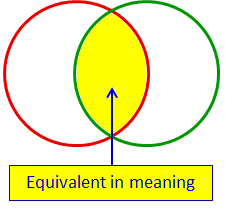The 'perfect translation' illusion
One common fallacy is that there is such a thing as a perfect translation.
Translations are not perfect. They are about capturing the meaning of a text in one language and conveying that meaning as accurately and fully as is possible and practical in the words of another language.
Few one-to-one equivalents
Most words in one language do not have one-to-one relationships with words in another. The only pure equivalents are words like 'two', 'three', 'four', etc.; these can normally be translated into another language without any difficulty. But most other words have whole clusters of connotations and usages around them which are not all identical to those of any single word in another language.
Meaning is contextual
Moreover, words take their meaning from the context in which they are used. The expression, Out of sight – out of mind, is made up of two phrases that could be 'translated' as Invisible, insane, but such a 'translation' would not in any way convey the meaning of the phrase as a whole.
 Where does meaning come from?
Where does meaning come from?
The possible meanings and usages of the sounds, words, signs, etc. of a language are a matter of implicit agreement among native speakers of the language concerned. This consensus can vary from place to place within a language area, and it is in constant movement, evolving over time from one generation to the next.





